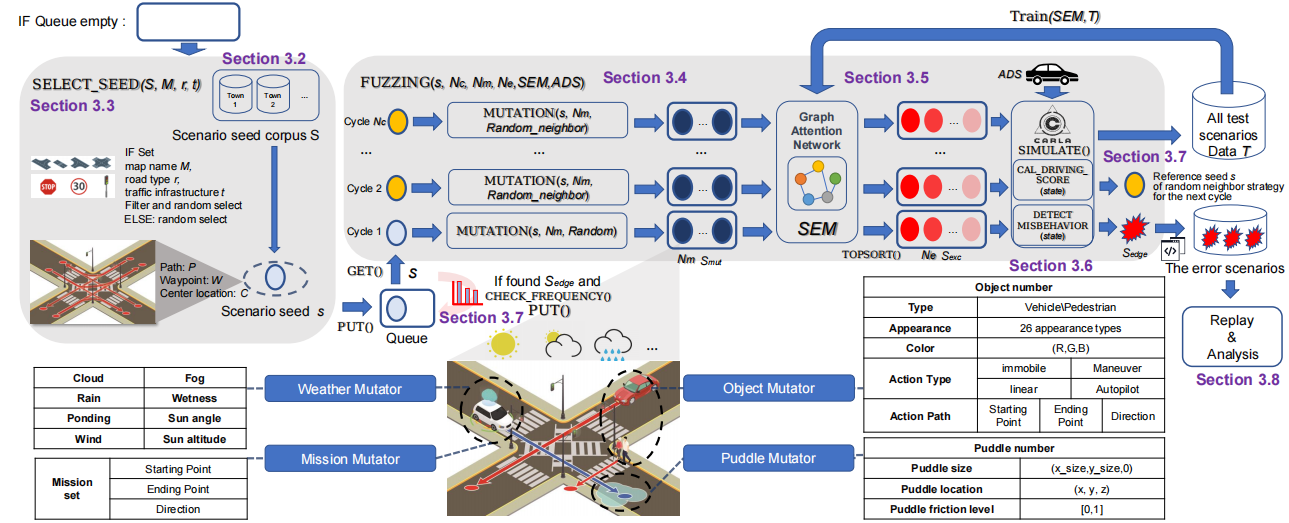I am currently an Assistant Researcher in Computer Science, specializing in artificial intelligence (AI) testing technology. After obtaining my Bachelor’s degree in Information and Computational Science from the School of Mathematics and Statistics at Beijing Institute of Technology in June 2019, I began my Master’s studies in Computer Software and Theory at the Academy of Military Sciences in September 2019. I transitioned to a doctoral program in April 2021 in the same field. My research primarily focuses on:
- The safety testing of autonomous driving systems
- Adversarial example research
- Large Language Model (LLM) applications
These efforts aim to enhance the reliability and security of AI applications in critical areas.
🔥 News
- 2025.09:🎉 “Parallel Fuzzing based on Sub-tasks Scheduling” has been accepted at ACM Transactions on Software Engineering and Methodology (TOSEM)!
- 2024.11:🎉 “Density Boosts Everything: A One-stop Strategy for Improving Performance, Robustness, and Sustainability of Malware Detectors” has been accepted at the Network and Distributed System Security Symposium 2025 - Fall Review Cycle (NDSS 2025 Fall)!
- 2024.11:🎉 “Enhancing Adversarial Robustness through Self-Supervised Confidence-Based Denoising” has been accepted at the 23rd IEEE TrustCom (TrustCom 2024, 110/555=19.82%).
- 2024.07:🎉 “Dance of the ADS: Orchestrating Failures through Historically-Informed Scenario Fuzzing” has been accepted at the 33rd ACM SIGSOFT International Symposium on Software Testing and Analysis (ISSTA 2024, 143/694=20.6%)!
- 2023.11: 🎉 “ADV-POST: Physically Realistic Adversarial Poster for Attacking Semantic Segmentation Models in Autonomous Driving” presented at the International Conference on Neural Information Processing (ICONIP 2023).
- 2023.09: 🎉 “Test Suite Generation Based on Context-Adapted Structural Coverage for Testing DNN” presented at the 2023 24th Asia-Pacific Network Operations and Management Symposium (APNOMS 2023), and received the “Student Best Paper Awards”!
- 2023.07: 🎉 “Driving into Danger: Adversarial Patch Attack on End-to-End Autonomous Driving Systems Using Deep Learning” presented at the 2023 IEEE Symposium on Computers and Communications (ISCC 2023).
- 2023.06: 🎉 “物理对抗补丁攻击与防御技术研究综述” accepted at Journal of Cyber Security (信息安全学报).
- 2023.06: 🎉 “Risk Scenario Generation for Autonomous Driving Systems based on Scenario Evaluation Model” presented at the 2023 International Joint Conference on Neural Networks (IJCNN 2023).
📝 Publications
🧑🎨 Selected Publications

Risk Scenario Generation for Autonomous Driving Systems based on Scenario Evaluation Model
Tong Wang, Xiaohui Kuang, Huan Deng, Taotao Gu, Wei Kong, Jianwen Tian, Gang Zhao
- Introducing a scenario evaluation model to enhance risk scenario generation.
- Establishing a scenario-based testing framework using the CARLA Leaderboard to explore risk scenarios in autonomous driving systems.
- Conducting a cross-sectional comparison of three open-source systems, LAV, Transfuser, and NEAT, to highlight safety distinctions.

Driving into Danger: Adversarial Patch Attack on End-to-End Autonomous Driving Systems Using Deep Learning
Tong Wang, Xiaohui Kuang, Hu Li, Qianjin Du, Zhanhao Hu, Huan Deng, Gang Zhao
- Conducting a study on ADS using the CARLA Leaderboard, focusing on adversarial example generation.
- Proposing a data collection theory for generating adversarial examples with post-realism optimization.
- Developing an effective loss function targeting ADS through route planning and control signal information.
- Implementing adversarial patches, specifically in the form of a T-shirt, to demonstrate dangerous behaviors in ADS under simulation.

Dance of the ADS: Orchestrating Failures through Historically-Informed Scenario Fuzzing
Tong Wang, Taotao Gu, Huan Deng, Hu Li, Xiaohui Kuang, Gang Zhao
- Unveiling ScenarioFuzz, a pioneering scenario-based fuzz testing methodology for autonomous driving systems.
- Extracting essential data from map road networks to form a foundational scenario seed corpus for fuzz testing.
- Integrating specialized mutators and mutation techniques with a graph neural network model to optimize the fuzzing process.
- Reducing time cost by an average of 60.3% and increasing error scenarios discovered per unit of time by 103%.
- Proposing a self-supervised collision trajectory clustering method to identify and summarize high-risk scenario categories.
- Successfully uncovering 58 bugs across six tested systems, highlighting critical safety concerns of ADS.
📚 All Publications
📅 2025
TOSEMParallel Fuzzing based on Sub-tasks Scheduling, Taotao Gu, Tong Wang, Xiang Li, Shuaibing Lu, Yuanping Nie, Zhaowei Zhang, Xiaohui Kuang, Gang Zhao. (CCF-A, SCI Q1)NDSS 2025Density Boosts Everything: A One-stop Strategy for Improving Performance, Robustness, and Sustainability of Malware Detectors, Jianwen Tian, Wei Kong, Debin Gao, Tong Wang, Taotao Gu, Kefan Qiu, Zhi Wang, Xiaohui Kuang. (CCF-A)IJFCCVR City: A Tool for Understanding Control Flow in Linux Kernel, Shuanghui Yi, Xiaoyan Su, Tong Wang, Shaobo Yu, Bingru Wu, Hang Li.
📅 2024
Trustcom 2024Enhancing Adversarial Robustness through Self-Supervised Confidence-Based Denoising, Yongkang Chen, Tong Wang, Wei Kong, Taotao Gu, Guiling Cao, Xiaohui Kuang. (CCF-C)ISSTA 2024Dance of the ADS: Orchestrating Failures through Historically-Informed Scenario Fuzzing, Tong Wang, Taotao Gu, Huan Deng, Hu Li, Xiaohui Kuang, Gang Zhao. (CCF-A)
📅 2023
ICONIP 2023ADV-POST: Physically Realistic Adversarial Poster for Attacking Semantic Segmentation Models in Autonomous Driving, Huan Deng, Minhuan Huang, Tong Wang, Hu Li, Jianwen Tian, Qian Yan, Xiaohui Kuang. (CCF-C)APNOMS 2023Test Suite Generation Based on Context-Adapted Structural Coverage for Testing DNN, Wei Kong, Qianjin Du, Huayang Cao, Hu Li, Tong Wang, Jianwen Tian, Xiaohui Kuang. (CCF-C)ISCC 2023Driving into Danger: Adversarial Patch Attack on End-to-End Autonomous Driving Systems Using Deep Learning, Tong Wang, Xiaohui Kuang, Hu Li, Qianjin Du, Zhanhao Hu, Huan Deng, Gang Zhao. (CCF-C)AdvML 2023Toward Testing Deep Learning Library via Model Fuzzing, Wei Kong, Huayang Cao, Tong Wang, Yuanping Nie, Hu Li, Xiaohui Kuang.信息安全学报物理对抗补丁攻击与防御技术研究综述, 邓欢, 黄敏桓, 李虎, 王彤, 况晓辉. (CCF-B)IJCNN 2023Risk Scenario Generation for Autonomous Driving Systems based on Scenario Evaluation Model, Tong Wang, Xiaohui Kuang, Huan Deng, Taotao Gu, Wei Kong, Jianwen Tian, Gang Zhao. (CCF-C)
📅 2022
ICSIP 2022DP2Net: Defense Against Adversarial Examples by Detecting Perturbed Pixels, Tong Wang, Haitian Liu, Feng Wang, Junchao Du, Yang Bao.
📅 2021
IJCNN 2021An Efficient Method to Measure Robustness of ReLU-Based Classifiers via Search Space Pruning, Xinping Wang, Liangyu Chen, Tong Wang, Mingang Chen, Min Zhang. (CCF-C)AEMCSE 2021Safety Testing of Neural Network for Image Classification, Tong Wang, Feng Wang, YunZhi Xue, Yang Bao.
📅 2020
DSA 2020A Coverage-Based Effective Data Augmentation Framework, Shuting Kang, Tong Wang, PengQi Wang, Feng Wang, Qian Dong, Guang Yang, LingZhong Meng, YunZhi Xue.
🎓 Academic Experience
📝 Reviewer Experience
- Information Processing & Management (IPM) - Reviewer
- International Joint Conference on Neural Networks (IJCNN) - Reviewer
📖 Educations
- 2019.09 - 2024.06, Ph.D., Academy of Military Sciences, China.
- 2015.09 - 2019.06, Bachelor, Beijing Institute of Technology, China.
